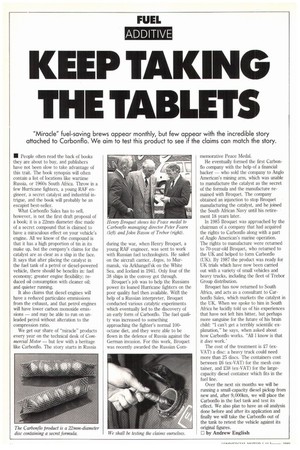KEEP TAKING THE TABLETS
Page 36

If you've noticed an error in this article please click here to report it so we can fix it.
"Miracle" fuel-saving brews appear monthly, but few appear with the incredible story attached to Carbonflo. We aim to test this product to see if the claims can match the story.
in People often read the back of books they are about to buy, and publishers have not been slow to take advantage of this trait. The book synopsis will often contain a list of locations like wartime Russia, or 1960s South Africa. Throw in a few Hurricane fighters, a young RAF engineer, a secret catalyst and industrial intrigue, and the book will probably be an escapist best-seller.
What Carbonflo Sales has to sell, however, is not the first draft proposal of a book; it is a 22mm diameter disc made of a secret compound that is claimed to have a miraculous effect on your vehicle's engine. All we know of the compound is that it has a high proportion of tin in its make up, but the company's claims for the catalyst are as clear as a slap in the face. It says that after placing the catalyst in the fuel tank of a petrol or diesel-powered vehicle, there should be benefits in: fuel economy; greater engine flexibility; reduced oil consumption with cleaner oil; and quieter running.
It also claims that diesel engines will have a reduced particulate emmissions from the exhaust, and that petrol engines will have lower carbon monoxide emissions — and may be able to run on unleaded petrol without alteration to the compression ratio.
We get our share of "miracle" products every year on the technical desk of Commercial Motor — but few with a heritage like Carbonflo. The story starts in Russia
during the war, when Henry Broquet, a young RAF engineer, was sent to work with Russian fuel technologists. He sailed on the aircraft carrier, Argos, to Murmansk, via Arkhangel'sk on the White Sea, and Iceland in 1941. Only four of the 38 ships in the convoy got through.
Broquet's job was to help the Russians power its loaned Hurricane fighters on the poor quality fuel then available. With the help of a Russian interpreter, Broquet conducted various catalytic experiments which eventually led to the discovery of an early form of Carbonflo. The fuel quality was increased to something approaching the fighter's normal 100octane diet, and they were able to be flown in the defence of Russia against the German invasion. For this work, Broquet was recently awarded the Russian Corn
memorative Peace Medal.
He eventually formed the first Carbonflo company with the help of a financial backer — who sold the company to Anglo American's mining arm, which was unable to manufacture the catalyst as the secret of the formula and the manufacture remained with Broquet. The company obtained an injunction to stop Broquet manufacturing the catalyst, and he joined the South African Navy until his retirement 18 years later.
In 1985 Broquet was approached by the chairman of a company that had acquired the rights to Carbonflo along with a part of Anglo American's marine operation. The rights to manufacture were returned to 70-year-old Broquet, who returned to the UK and helped to form Carbonflo (UK). By 1987 the product was ready for UK trials which have now been carried out with a variety of small vehicles and heavy trucks, including the fleet of Trebor Group distribution.
Broquet has now returned to South Africa, and acts as a consultant to Carbonflo Sales, which markets the catalyst in the UK. When we spoke to him in South Africa he lucidly told us of his experiences that have not left him bitter, but perhaps more sanguine for the future of his brain child: "I can't get a terribly scientific explanation," he says, when asked about how Carbonflo works. "All 1 know is that it does work.'
The cost of the treatment is £7 (exVAT) a disc: a heavy truck could need more than 25 discs. The containers cost between £6 (ex-VAT) for the mesh container, and 08 (ex-VAT) for the largecapacity diesel container which fits in the fuel line.
Over the next six months we will be running a small-capacity diesel pickup from new and, after 9,000km, we will place the Carbonflo in the fuel tank and test its effect. We also plan to have an oil analysis done before and after its application and finally we will take the Carbonflo out of the tank to retest the vehicle against its original figures.
E by Andrew English
















































































